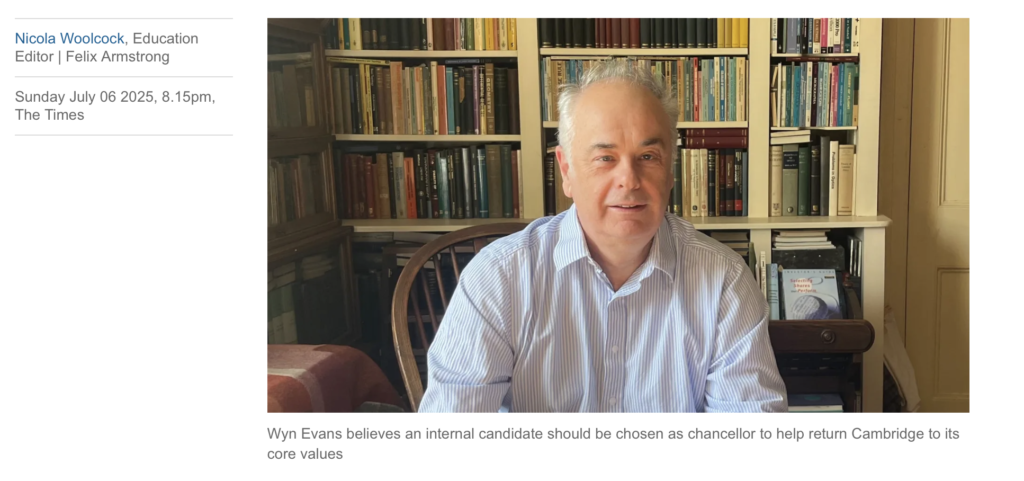
The Times interviewed Wyn Evans, who spoke of the difficulties faced by young scholars in the article.
Sometimes young scholars can find access to research grants hindered.
There are a number of ongoing Employment Tribunals in which young scholars are arguing that the blocking or rewriting of research grants by Heads of Department is part of a wider picture of victimisation against them.
If you apply for a grant, you will need the permission of your Head of Department. There are of course some good reasons for this. The Head of Department needs to ensure that space and facilities are available, so that the work in the grant (if awarded) can be feasibly done in the department.
Nonetheless, this power can sometimes be abused. Unscrupulous Heads of Department can for example refuse to accept grants from individuals that they do not like, or make numerous unreasonable conditions, or refuse to permit certain lines of inquiry, or even insist that they are made co-investigators.
Wyn Evans said it was a little discussed aspect of free speech that young academics could find research ideas stifled by more senior figures in their departments.
While antisemitism and trans rights had more publicity, free speech issues were causing wider problems, he said in an interview.
The professor of astrophysics said: “Freedom of speech often comes up in this context in universities, although it’s not much discussed, that young academics can find promising avenues of exploration blocked by more senior figures in their department.
“With free speech, these bread and butter issues are much more likely to be what individual academics encounter. Of course on larger issues, we must have complete freedom to speak and to listen to others with whom we disagree. That’s part of the ethos of any university.
“When a younger academic decides to apply for a grant, they will need permission from at least the head of department, and they will have to have their application examined carefully. Some of it makes sense. But it can often happen that young academics, and this is particularly the case in the arts and humanities, find such grants blocked or hindered because of academic jealousy.”
There needs to be much greater clarity on the powers of Heads of Department to reject or hold up grant applications.
Although not often identified as such, this is a free speech issue. The principle of academic freedom means that each researcher should be free to follow the dictates of his or her own curiosity, without needing to placate a Head of Department.
3 Comments
TigerWhoCametoET · 7 July 2025 at 18:04
Yes. Thank you for standing up for young scholars. This is the real challenge for emerging researchers not able to freely express their views or share their experiences without fear of retaliation.
SPARTACUS · 8 July 2025 at 09:47
The University is fully aware of the dictatorial decisions taken by its protected favourites! A top core funded Institute within the University has a Director that uses his position to block grant applications from members of his own faculty! This Director has also been involved in several cases of serious bullying and again the University top management (VC, ProVCs, Registrar, Head of HR, Head of the Clinical School) are all aiding and abetting this rogue dictatorial Director! The election of Lord BP will ensure the University will continue to act as Post Office 2.0!
Eileen Nugent · 10 July 2025 at 22:38
Decisions by head of department in relation to early career academics can be completely arbitrary & when that is the case early career researchers are typically left at the mercy of further decisions by the head of department in relation to them irrespective of how poor the judgment of the head of department has been. From an organisational perspective this makes very little sense as it increases the organisational risk of a case spiralling out of all control and generating unconstrained amounts of stress for individuals. If the head of department has already potentially made multiple errors in relation to a particular individual the least the organisation could do is get a fresh perspective on the case and make a genuine attempt to resolve it. Some cases in universities are taking 10 years to resolve, its very rare an early career researcher has a 10-year contract. Universities bank on most individuals choosing not to pursue civil employment cases in the employment tribunal because of the potential impact of such a case on health, finances, employment & academic career. What universities might not yet have appreciated is that an individual with a specific legal obligation to an organisation may be left with no option but to take action to bring a prosecution against the organisation in order to comply with that specific legal obligation to the organisation.